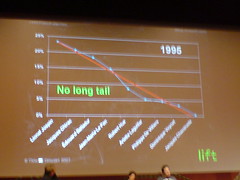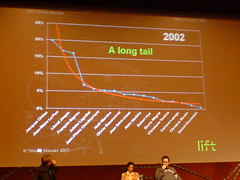Wi-fi
February 09, 2007 | CommentsSomething occurred to me in mid-conversation yesterday: have you ever been to a tech conference where the Wi-fi was well-spread, offered sufficient bandwidth, and worked solidly throughout the whole event?
Me neither. If we have such trouble doing it for a limited, tech-savvy audience in a limited area for a limited time, what does that suggest regarding the "Wi-fi is going to kill telcos" meme?
links for 2007-02-09
February 09, 2007 | Comments-
Cartoon to be given away online, by the guy sitting next to me at the LIFT07 keynote
-
Sources close to Nokia say that Symbian is secretly regarded inside the company--even among high level senior executives--as a "piece-of-shit-OS,"
-
Nice interview with Russell @ Admob
-
I like the 4-question test
-
"I'm not wishing confusion and chaos on your team. I'm actually wishing better communication on it. My belief is that if you are building the product and touching the features that you'll be closer to your team. But, more importantly you'll be closer to h
-
One micron over the reality/satire barrier
-
...and Sponge at #6, I note. Congrats to all of ye
-
Samsung just announced an i7 device with orientation-dependent UI which they call Physical User Interface (PUI). The i7 is equipped with a 3.0” touch screen LCD which rotates through 180 degrees allowing the user to quickly switch between features.
-
Some brilliant mind thinks of a way to save money or deliver earlier by patching up and shipping the prototype.
-
Adam put me onto these guys today...
LIFT07 Wrap-up: Daniel Kaplan, Fédération Internet Nouvelle Génération
February 09, 2007 | CommentsLIFT07 Wrap-up: Daniel Kaplan, Fédération Internet Nouvelle Génération
We've been talking about increasingly embedded technology: into bodies, buildings and spaces. We won't enjoy the comfort of cyberspace now; what we're doing will have consequences in the real world, which we've ignored up til now.
It's not about productivity, it's about introducing disorder (or innovation, if you prefer that term).
What we're talking about is assertive technology, which acts as interlocutors for you.
One of the ways of building ones identity is to build it against other people: "these are not my values". There's a value to hiding information, to privacy... and a cost to transparency.
How do we solve major global problems we face? Global warming, oil supply, etc. Consider the cost of, say, 2nd Life avatars (particularly in a world with famine, say).
Power, borders, conflict: they're all here. Some are legitimate. The long tail of politics involves some fairly nasty political views getting prominence. Problems like this are not self-solving. Walmart etc post higher profits than ever - maybe not in 10 years time, but we said that 10 years ago.
LIFT07: The New Economics of Creation, Panel
February 09, 2007 | CommentsLIFT07: The New Economics of Creation, Panel
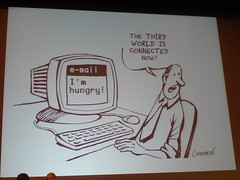 Moderated by Philippe Mottaz, director, AnyScreen
Moderated by Philippe Mottaz, director, AnyScreen
L to R:
John Buckman: Founder, Magnatune and BookMooch, Creative Commons Board Member
Rodrigo Sepulveda Schulz: CEO, vpod.tv
Zhang Ga: Artistic Director / Curator, China International New Media Arts Exhibition 2008
Patrick Chappatte: Cartoonist
PM: How do we finance arts and culture in a world where "free" is a guiding light?
PC: As a cartoonist, I'm closer to a journalist than an artist. Technology makes the world smaller. The internet was supposed to solve all the worlds problems (was it?).
PC shows off a whole load of excellent cartoons :)
JB: I run a music web site called Magnatune (strapline: "we are not evil"). How do you make money for musicians in a world where music can be obtained for free? The music business is seen as an evil corrupting force, because it behaves like one. There's limited diversity in stores (look at the decline of classical). Using file sharing is "just acting like a just-cause revolutionary". If the music industry dies it'll take a lot of culture down with it. Magnatune sells downloads and CDs using a Creative Commons license so non-commercial use can be made for free. We sell music we have selected (about 600 albums). Customers pay what they want, 50% goes to the musician. On average folks play $8.70 (more than the minimum $5). Everywhere throughout the site are closeups of musicians faces looking at you, to help build a connection with them. The Body Shops "no animal testing" is really saying "if you buy Chanel, you're hurting bunny rabbits". They also license to film makers etc. (except porn or politics). Podcasting is illegal with commercial music, we allow podcasters to use our music through a special license. Music reviewers can get music for free too. They ask purchasers to give their album to 3 friends: "because we know you've discovered great music through your friends". JB puts his face all over the web site too, to keep things personal.
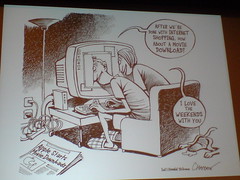 RSS: I'm co-founder at vpod.tv, we enable everyone to create their own TV channel. 2006 saw an explosion in online video companies. Time shifting, device shifting, place shifting. How do you retain customers here? Is YouTube what Internet video should be? Shows the Venice Project/Joost. Bubblegum and vpod.tv are doing similar things. 20 people, simplify the creation of TV channels, connecting any video source to any screen in a few clicks. Cut off by moderator - this was interesting looking, but a sales presentation.
RSS: I'm co-founder at vpod.tv, we enable everyone to create their own TV channel. 2006 saw an explosion in online video companies. Time shifting, device shifting, place shifting. How do you retain customers here? Is YouTube what Internet video should be? Shows the Venice Project/Joost. Bubblegum and vpod.tv are doing similar things. 20 people, simplify the creation of TV channels, connecting any video source to any screen in a few clicks. Cut off by moderator - this was interesting looking, but a sales presentation.
ZG: My business is not money-making. I'm a curator from NY, working on a project for National Art Museum of China. There are v few institutions dedicated to production and discussion of new media arts, IDEM (?). I deal with artists, they don't make money: they have part-time jobs, they get funding from foundations, get occasional commissions. There's no market in the art world for media-based art (specifically new media). There's hardly any state funding for art in the US, the market is driven by money so it's a business.
PM: I'm doubtful about this. Rodrigo, the value proposition of Magnatune is clear. Why would I give my video to ipod.tv, if I have talent or know-how? How do you have a sustainable model if you're not paying?
RSS: We do revenue share, 50/50 with the content creator. It's a collective fantasy that everyone will make money out of this. Advertising audiences are counted by the 1000 - ad units go for 10-20 Euros. The media are saying to everyone that they'll make money out of this, but that's not true.
PC: I never had to make money from the web, so it was a luxury for me. I'm paid by newspapers. Before, I was with a syndicator in New York who had a thousand cartoonists. I quit the syndicator in 1995 to start my own web site (globecartoon.com), which let me syndicate my own cartoons. The syndicators aren't agents, they just syndicate content.
PM: Can we agree on the notion of fair culture?
JB: With the internet, aggregators and distributors have less power. Now there are deals where the artist keeps copyright and makes 20%, say.
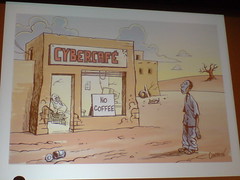 Audience: I'm a photographer and I use Flickr. Flickr got me commissions thanks to photos I put up via Creative Commons, so it works as advertising. The network of people who see my images acts to control copyright infringement. e.g. someone saw a photo of mine being used by Amex in the US and alerted me.
Audience: I'm a photographer and I use Flickr. Flickr got me commissions thanks to photos I put up via Creative Commons, so it works as advertising. The network of people who see my images acts to control copyright infringement. e.g. someone saw a photo of mine being used by Amex in the US and alerted me.
JB: The language we use in our licenses is "you may not use this media for commercial gain". In the states, the enforcement rule of thumb is 3 x license fee + legal fees
I lost interest here and got distracted by interesting discussions in the IRC backchannel...
JB: 2 years ago big media was suing any new radical companies in the market. Now they're working with YouTube instead of trying to destroy it. The ecology to support creative people is emerging. The online magazine Slate went profitable this year.
PC: The average user who copies a cartoon and puts in on his website isn't making money. I just expect them to link back to the author, that's all I ask for.
ZG: The attention economy does not necessarily generate revenue. Successful artists aren't necessarily rich.
LIFT07: Panel: The user/citizen centered society
February 09, 2007 | Comments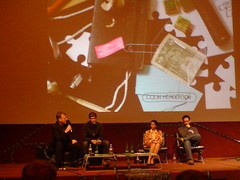 LIFT07: Panel: The user/citizen centered society
LIFT07: Panel: The user/citizen centered society
Moderator: Bruno Giussani
Robert Scoble, Podtech
Beth Krasna, Independent Board Member
Thierry Crouzet, writer, BonWeb.com
Derek Powazek, founder, JPG magazine
RS: talking about John Edwards. On his plane, he had me, him, a video guy, a photographer posting to Flickr, a blogger writing (and also reading TechMeme, etc. to track the conversations), a strategist, and an advance guy. UGC has been brought into campaigns. Everyone in this room has the ability to spread an idea worldwide in a few hours.
TC: Politicians don't understand the net and they fear it.
BG: Thierry, you're involved with the long tail of politics.
TC: (Talking about The French Paradox) More TV = more abstention in elections. Shows a graph linking rise in TV viewing to rise in abstention rates. Shows another chart: number of party members has been rising slightly as number of weblogs grows. The hypothesis is that blogging has led to a rise in political participation: "the long tail of politics". Compares 1995 elections to 2002 - very different distribution of votes amongst candidates.
(Is this driven by a desire to become politically engaged in more ways, or by dissatisfaction with the major parties - i.e. is it a push to the right of the curve, or a pull from the left?)
BG: So politics is getting broken up just as music has been?
RS: The Internet can present choices better than old media. Old media can only present 3 candidates.
TC: Politicians want to be alone on-stage.
RS: Big media doesn't like it because they see their audience erode into long tail. Generally politicians are good at dealing with the crowd, so the good ones will handle it.
D: "When the going gets weird, the weird go pro" is the subtext for this talk. Design matters - when you look as good as the mainstream media you get taken as seriously. We're combining the magazine and art businesses, which are both elitist. The internet lets us run around the walls these businesses set up around themselves. We let anyone submit an article under a theme and users vote on them. We had 7000 submissions from the last issue and printed 100 - competition is furious. Media is increasingly participatory - soon media you can't participate in will be boring. We make money via ads and subscriptions. We pay photographers $100 per photo and a free subscription. We "tolerate" professionals.
BG: Much of UGC is about constraining people into a theme.
D: If anyone ever says to you "it's like Wikipedia for X", they're doomed. People don't want to make things for you, you give them an opportunity to create and thank them: "internally design for selfishness".
BG: You're not going to kill professional photographers?
RS: No, we'll still need professionals, people skilled at telling stories through photography will still rise to the top. Maybe not by selling cover images to Time Magazine for $50k, but still...
Q: As a journalist, I'm concerned. The conversation just went from "do we need professional photographers", to a business model. I like bloggers - they're a crucial part of the community. Pros do a separate job. Interns, say, have a writing background but don't know about copyright issues.
(comment from backchannel: "we need spam filters in the mics")
Q: I don't buy this is a big shift.
BK: It's faster and there's more out there.
RS: Look at the way we can reference YouTube videos here.
BK: It's because of the internet, things move faster.
